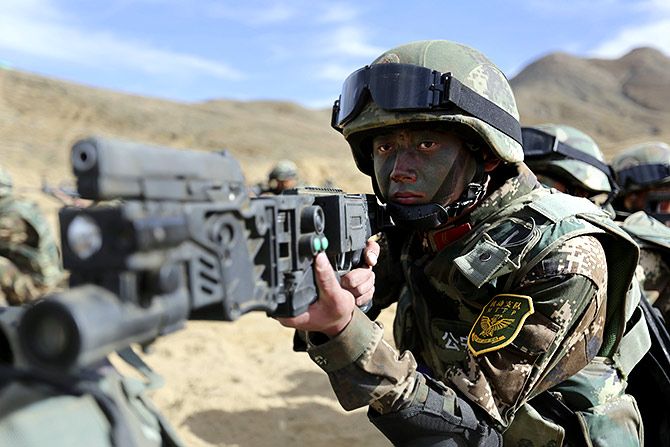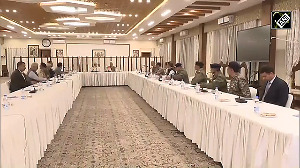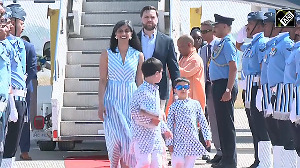The Chinese Communist party has not closed its door of contacts and negotiation with the Dalai Lama, a senior Communist leader wrote recently.
Former RA&W officer and China expert Jayadeva Ranade explains what the thinking on Tibet is likely in Beijing.

There has been an elevated level of activity by the Chinese Communist Party in Tibet and the adjoining Tibetan areas since mid-last year.
Especially since the beginning of this year, this has included some important visits to the Tibet Autonomous Region (TAR).
The TAR has also been witness to successive ideological education campaigns, exhorting, among other things, monks and nuns in monasteries to adapt Tibetan Buddhism to 'socialism with Chinese characteristics'.
There has simultaneously been a continuing steady tightening of security in the TAR.
The plenary session of the 13th National People's Congress -- China's version of a parliament -- that was held in Beijing from March 5-15, 2019, approved an 8.3% hike in the TAR's security budget.

Campaigns to weed out cadres harbouring pro-Dalai Lama sentiments, instil loyalty and preach the Communist party's message to the Tibetan people commenced soon after the 19th party congress in October 2017 with the state-run Tibet Daily disclosing that more than 20,000 party cadres had been sent to the villages and 7,000 monasteries.
China's official media on February 21, 2019 asserted that 800,000 Tibetans had been 'educated' in the spirit of the 19th party congress in the previous 18 months.
A new campaign currently underway instructs monks to take a strict 'stand against separatism' in compliance with China's ongoing 'Sinicisation-of-religion' policy.
It asked monks to 'feel grateful to the Chinese government and show their loyalty to the nation by obeying the country's laws.'
A set of '20 Prohibitions' were separately listed with China's official Global Times reporting that more than 30,000 Buddhist monks and nuns in the TAR had been 'tested' a month later for their knowledge on laws and regulations.

When Chinese Communist party central committee politburo standing committee member and chairman of the Chinese people's political consultative conference Wang Yang met the Chinese-appointed Panchen Lama Gyaltsen Norbu on May 5, he told him that the Panchen Lama 'as a leader of Tibetan Buddhism shoulders a great responsibility of leading Tibetan Buddhism in the right direction, and safeguarding the unification of the motherland and the ethnic solidarity'.
Wang also said he 'hopes to see the Panchen Lama taking a firm political stand, and lead the religious figures and believers in fighting against all separatist elements'.
Gyaltsen Norbu was told to take the 'lead in interpreting Buddhist doctrines to adapt them to China's socialism'.
The Chinese people's political consultative conference oversees policies governing China's ethnic minorities, religious entities and relations with non-Communist parties.

Among the important visits to Tibet so far this year are those by the China-appointed Panchen Lama Gyaltsen Norbu, Wang Yang and the US Ambassador to China, Terry Branstad.
During his visit to Tibet in May, Branstad said, 'I encourage the Chinese government to engage in substantive dialogue with the Dalai Lama or his representatives, without preconditions, to seek a settlement that resolves differences.'
Against this backdrop, the publication by the official Global Times on June 9, of an article by Zhu Weiqun -- a senior though recently retired Chinese Communist cadre -- assumes significance.
Zhu Weiqun is a former executive vice minister of the Chinese Communist party central committee's united front work department and till last year was chairman of the Chinese people's political consultative conference's ethnic and religious affairs committee.
He participated in all ten rounds of the 'negotiations' between the Dalai Lama's representatives and the Chinese Communists between 2002 and 2010 when they were suspended.
Zhu has stayed in close touch with Tibetan affairs and is well regarded in Beijing for his knowledge of Tibet-related affairs.

Quite unusually, Zhu Weiqun said in his article that he was responding to the US ambassador's remark urging resumption of talks with the Dalai Lama and accused him of 'interference in China's internal affairs'.
Zhu Weiqun stated, however, that the Chinese Communist party central committee 'has not closed its door of contacts and negotiation with the Dalai Lama'.
In brief, he reiterated China's consistent position that it doesn't recognise the Tibetan government-in-exile or 'Central Tibetan Administration' and that the talks are neither 'Tibetan-Han Talks' or 'Tibetan-China Talks'.
Zhu additionally clarified that 'the Dalai Lama must accept Tibet as an integral part of China, abandon all attempts about so-called Tibet independence, stop all separatist and destructive activities, and recognise Taiwan as an integral part of China'.
Stating that the above issues 'underline that there is no so-called Tibet issue', but it is 'just the problem of the Dalai Lama'.

Meanwhile, coinciding with the stepped up security and stringent regulations imposed on the Tibetan Buddhist clergy, is the persistent rumour circulating for some months among Chinese officials of the Dalai Lama's ill-health.
Zhu Weiqun's unusual and curiously timed article could hint at thinking in Beijing of resuming the earlier pattern of contacts with the Dalai Lama.
Jayadeva Ranade, former Additional Secretary in the Cabinet Secretariat, Government of India, is the President, Centre for China Analysis and Strategy.












 © 2025
© 2025